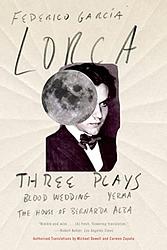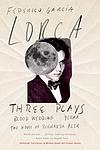Blood Wedding by Federico García Lorca
"Blood Wedding" is a tragic play that delves into the themes of passion, family feuds, and societal norms. It tells the story of a bride who, torn between duty and desire, flees her own wedding with her former lover, Leonardo, who is married and from a feuding family. The narrative builds to a climax of inevitable tragedy as the bridegroom and Leonardo confront each other, leading to fatal consequences. The play explores deep emotions and the consequences of human actions, set against the backdrop of rural Spanish society, where honor and personal ties shape destinies.
The 9833rd greatest book of all time
Ranking Details:
Our ranking system awards points to books based on their appearance and position on curated lists. Here's how it works:
Unranked Lists: For lists without specific rankings, each book receives points equivalent to the list's weight. This approach recognizes the book's inclusion on prestigious lists.
Ranked Lists: Books on ranked lists receive points in two ways:
- Base Points: Initially, every book is awarded points equal to the list's weight, acknowledging its significance.
- Bonus Points: Additionally, books earn bonus points based on their ranking. The total bonus pool, equal to 100% of the list's weight, is distributed among the books, with higher-ranked books receiving more points.
Exponential Distribution: The distribution of bonus points follows an exponential model. This means the top-ranked book (#1) receives significantly more bonus points than those further down the list (e.g., #100). Our algorithm ensures that higher placements are rewarded more generously, reflecting the achievement of a top rank on any given list.
This scoring system ensures that each book's ranking reflects both its presence on multiple lists and its positions within those lists, providing a comprehensive measure of its acclaim and popularity.
Total Points: 21
Since this book was first published in 1933, there is a penalty of 0%. The age adjusted score is 21.0.
This is to prevent newer books from reaching super high on the ranked list of the greatest books of all time. The greatest books should also stand the test of time.
- score: 21 -- The Drama 100 - A Ranking of the Greatest Plays of All Time (Weight: 21)

